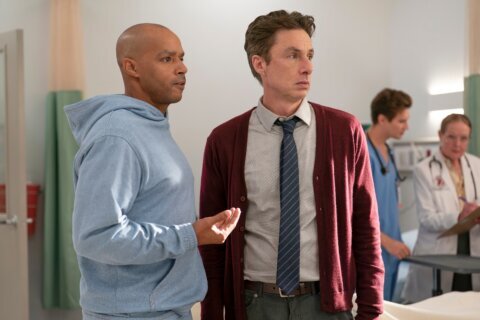The 37th annual Filmfest DC returns this week at Landmark E Street Cinema in Penn Quarter from April 19 to 30.
However, the festival is so much more than brick-and-mortar screenings, expanding with outreach around town.
“The city is coming out of COVID, and we knew that in this post-COVID world that we had to do some new things to keep people interested,” Festival Director Tony Gittens told WTOP. “Mazza Gallerie is gone, the world has changed, and therefore we have to change with it. … One point we wanted to make this year is the relevance of the festival outside the walls of the movie theater. … We want to cheer people up and we’re here to serve.”
Opening night kicks off at the Embassy of France for a screening of “Chevalier” about Joseph Bologne, the Caribbean son of an African slave and a French plantation owner who rises to become a French composer.
“When I saw this film, I wanted to have D.C. high school kids see it,” Gittens said. “We thought that it would be inspirational, so one of the new things we’re doing is we’re getting busses … and taking these kids to the Embassy of France to see this film on a Wednesday. We think they may not only enjoy the film, but I wanted to encourage young people to feel comfortable in embassies and other cultural institutions not in their neighborhoods.”
Filmfest DC is also working the group Teaching for Change to bring films directly to D.C. Public Schools, sending screening links to the teachers, who screen the movies for their students, discuss the themes in their classes, then welcome the filmmakers for riveting discussions with students who have already formulated their questions.
“We’ve been doing this for a while and it really exposes the kids to films they normally wouldn’t see,” Gittens said. “The filmmakers love it. They’re from all over the world, and they love it because they don’t speak to this kind of audience. They’re not used to this, and they’re moved and energized by kids who are asking great questions.”
The festival is also working with ASL interpreters for an accessible event at Landmark E Street Cinema where deaf and hard-of-hearing viewers are handed balloons to feel the vibrations of the sounds on screen.
“I watched the film ‘CODA,’ which won the Academy Award a couple of years ago, about a deaf family, and I was so moved by the film that we’re doing a program for the hard-of-hearing and deaf community,” Gittens said. “It’s a film called ‘The Tuba Thieves,’ a film by deaf people for people that are hard of hearing. It was a big hit at Sundance and we’re bringing in the film, the director and some special people who know more about this than I do.”
If you’re going to be down at The Wharf, you can watch the special outdoor screenings along the boardwalk adjacent to The Anthem. Filmfest DC materials will also be on display at The Wharf location of Politics and Prose.
“Politics and Prose is creating a reading list around the films and the film festival, which is great,” Gittens said. “They’re looking at our themes and finding books in their collection, then creating a table at their bookstore for people to come in and take a look at these books. It’s a way of them finding the film audience and us finding the literary audience, all of whom are good people who want to learn things and experience different cultures.”
It all builds to the closing night film “BlackBerry,” charting the rise and fall of the world’s first smartphone, followed by a filmmaker Q&A at E Street Cinema. After that, guests are invited to a wrap party at Penn Social.
“It’s a wonderful gathering place,” Gittens said. “It has television screens all over the place, we’re going to play some music so people can dance. We’re hoping to attract some people who normally wouldn’t find the festival.”
If you’re stuck at home, don’t worry. You can still check out “Filmfest DC on TV” on both WETA and WHUT.
“(WETA) will be showing some shorts that have been shown in the festival in past years and they will be broadcasting them several times between now and the end of the festival,” Gittens said. “Then WHUT, which is the Howard University public television station, they’ll also be broadcasting some films from our section that we call ‘Global Rhythms,’ our music-on-film section, so they’ll be broadcasting three films from this year.”
Tickets for opening night are sold out, but closing night tickets cost $25 and most other screenings cost $14. Young viewers ages 25 and under can come to the box office and get a “rush” ticket for just $5.
Find more information on the festival’s website.
Listen to our full conversation here.








